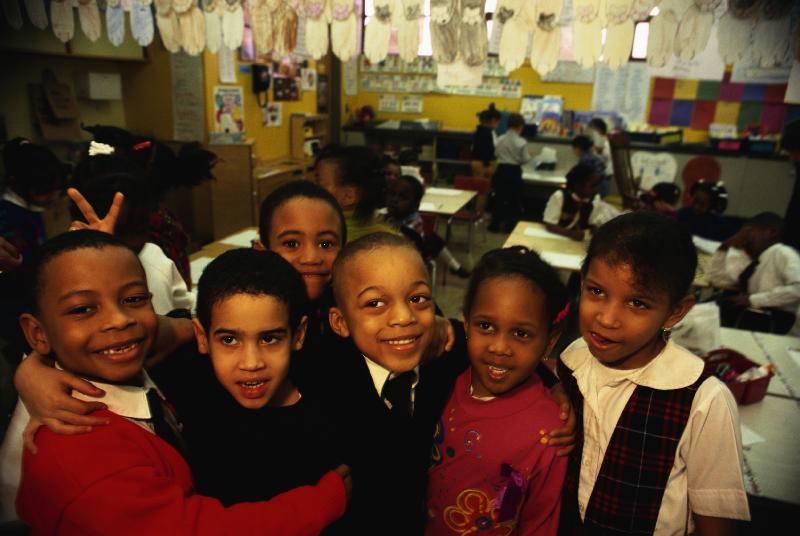Both Sides of the Critical Race Theory Debate Are Abandoning Black Children | Opinion
By: Robert Cherry (MSN)


But they aren't teaching it in schools..............so we are told LMAO

A debate is raging across the nation about education—but it's the wrong one.
© Mark Peterson // Corbis/Getty Black people have—rightly—asked Republicans for 50 years, "What do you have to offer me?" It's time to offer them a better education system.
Countless op-eds and news segments have run for and against critical race theory as the Left tries to deny it's being taught in schools and the Right tries to ban it. But anyone who truly cares about our country's most vulnerable students should recognize that the CRT debate is one big distraction from a much more important conversation, one about the plight of those children who are failing.
Take Baltimore, for example. In 2020, 41 percent of Baltimore's Black high school students had a grade point average of a D or less. While the pandemic certainly accentuated this problem, it was 29 percent in the 2019.
Baltimore is not alone: In 2019, 20 percent of black and Latino 9th graders living in San Diego had failing grades. More broadly, the vast majority of ACT-tested Black high school graduates did not perform well in core areas: reading, writing, math, and science. Only 11 percent of Black graduates performed at college levels in at least three of these subjects, compared to 50 and 58 percent of white and Asian graduates respectively.
The reason for this disparity in high school is clear: These Black students entered high school with deficient academic skills. Though among the best performing Florida school districts, Miami reported that the majority of its Black eighth grade students failed the state's English and Math proficiency exams. Nationally, only 11, 13, and 15 percent of eighth grade Black students were proficient in science, mathematics, and reading respectively, while more than 40 percent of white students were proficient in each of these areas.
So what explains this disparity in middle school? Liberal educators claim that they are overwhelmingly a function of poverty, school funding, and implicit racism. But these claims don't hold up: Baltimore schools spend $16,184 per pupil, more than all but three urban school systems nationally and 27 percent more than the average suburban school systems. And more than 40 percent of its teaching staff is African American.
National data also verifies that neither poverty nor school characteristics are sufficient explanations. When adjustments are made for family income, parental educational attainment, school resources, and teacher quality, one-half of the racial gap still remains. The remaining gaps are even larger for Black boys, especially those in schools with Black enrollment over 80 percent.
While poverty and racism don't explain these disparities, they are explained by a close examination of the Black family and even neighborhood. Three-quarters of non-immigrant Black children are born to unwed mothers, 29 percent to mothers 24 years old or younger, compared to 12 percent of white children. Young unwed mothers will often have children with sequential partners, so many of those children are raised with one biological parent missing and step-parents balancing children from different relationships. These situations are especially trying on boys, who often have limited contact with their biological fathers and indifference from their stepfathers.
And there is a direct correlation between father absence and incarceration rates. As Cynthia Harper and Sara McLanahan have reported, "The adolescents who faced the highest incarceration risks... were those in stepparent families, including father-stepmother families." And summarizing numerous studies, Roberta Coles found that having a cohabiting partner in the household "was associated with higher levels of virtually every problematic outcome measured: poorer conflict resolution skills, substance use, school deviance, antisocial behavior, and lower grades and effort at school."
Even worse, many children in these unstable situations suffer maltreatment. A Brookings study found that 17.7 percent of Michigan third graders had been investigated for maltreatment, with the Black rate at 28.9 percent. And there was a direct correlation between abuse and academic achievement: The share of children proficient in math and reading was more than 15 percent lower among those with at least one investigation, compared to those without an investigation.
"When there is violence nearby, students are less able to focus on academic tasks, and their performance suffers," Patrick Sharkey found in his book Uneasy Peace. "And when students move away from intensely violent neighborhoods, they show strong improvement in core cognitive skills."
Furthermore, those with an abuse investigation were 40 percent more likely to have been retained in either kindergarten, first, or second grade than those without an investigation.
And national data indicate that children living in Black families where a man other than the biological father resides have substantially higher maltreatment rates than similar white families, even after adjusting for income; they also have more than five times higher rates than children living in households with both biological parents.
These bleak outcomes have no easy solutions. One thing's for sure: Endlessly debating critical race theory does nothing to help our most vulnerable children. Of course, the debate over whether systemic racism or family breakdown was at the heart of struggling Black communities is not new. It's been hotly debated, at least since the Moynihan report in 1965. Let's agree not to spend another half-century debating causes, and instead look to solutions that we can hopefully all agree on.
For starters, combating gun violence is a prerequisite for turning poor neighborhoods around and enabling children to be academically fully engaged. And successful efforts require coordination between police and community efforts. Improved child development also requires support personnel—visiting nurses and educators—who engage families in their homes. And young men with deficient academic skills should be encouraged to gain occupational credentials rather than entering academic programs with a four-year college degree goal.
Only by focusing on these community and family problems can we hope to improve the life chances of the most vulnerable.
Robert Cherry is professor emeritus of economics at Brooklyn College.
The views expressed in this article are the author's own.






Good read and there is a lot of "underlyings" in there
The CRT debate is futile because CRT is not being taught in schools grades K-12.
How can there be a debate for something that doesn't exist?
Enjoy your bubble.........
Right back 'atcha JJ
The denial is a river that runs long and whiny in that country
I think inner city teachers are overwhelmed. I think there are students who probably belong in a special environment who stay in regular class for various reasons. When they get old enough they can cause real disruption.
I'm sure they are but as has been proven time and time again in big cities across the country, simply throwing money at never works long term. The problem is much deeper. It more or less starts and stops at the devolution of the family unit IMO. How many of those kids come from a stable household let alone a two parent one?
Very few ....